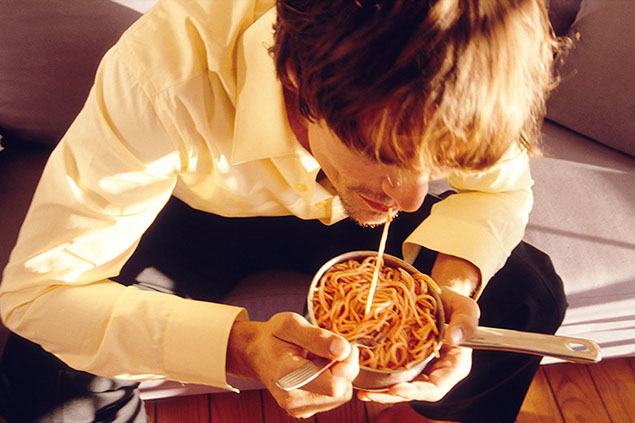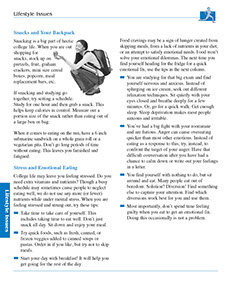CONDITIONS
SYMPTOM CHECKER
Male
Female
Child
Arm, Hand & Shoulder Concerns
Legs & Feet Concerns
Dental & Mouth Concerns
Ear & Nose
Eye Conditions
Head Conditions
Arm, Hand & Shoulder Concerns
Legs & Feet Concerns
Front
Back
Arm, Hand & Shoulder Concerns
Dental & Mouth Concerns
Ear & Nose
Eye Conditions
Head Conditions
Arm, Hand & Shoulder Concerns
Dental & Mouth Concerns
Ear & Nose
Eye Conditions
Head Conditions
Front
Back
Arm, Hand & Shoulder Concerns
Neck Links
Head & Neck Concerns
Arm, Hand & Shoulder Concerns
Neck Links
Head & Neck Concerns
Front
Back
Online Clinic
Wise Healthcare
Stress & Emotional Eating

Print on Demand
College life may leave you feeling stressed. Do you need extra vitamins and nutrients? Though a busy schedule may sometimes cause people to neglect eating well, we do not use any more (or fewer) nutrients while under mental stress. When you are feeling stressed and strung-out, try these tips:
RELATED ARTICLES
• Take time to take care of yourself. This includes taking time to eat well. Don’t just snack all day. Sit down and enjoy your meal.
• Try quick foods, such as fresh, canned, or frozen veggies added to canned soups or pastas. Order in if you like, but try not to skip meals.
• Start your day with breakfast! It will help you get going for the rest of the day.
Food cravings may be a sign of hunger created from skipping meals, from a lack of nutrients in your diet, or an attempt to satisfy emotional needs. Food won’t solve your emotional dilemmas. The next time you find yourself heading for the fridge for a quick emotional fix, use the following tips.
• You are studying for that big exam and find yourself nervous and anxious. Instead of splurging on ice cream, seek out different relaxation techniques. Sit quietly with your eyes closed and breathe deeply for a few minutes. Or, go for a quick walk. Get enough sleep. Sleep deprivation makes most people anxious and irritable.
• You’ve had a big fight with your roommate and are furious. Anger can cause overeating quicker than most other emotions. Instead of eating as a response to this, try, instead, to confront the target of your anger. Have that difficult conversation after you have had a chance to calm down or write out your feelings in a letter.
• You find yourself with nothing to do, but sit around and eat. Many people eat out of boredom. Solution? Diversion! Find something else to capture your attention. Find which diversions work best for you and use them.
• Most importantly, don’t spend time feeling guilty when you eat to get an emotional fix. Doing this occasionally is not a problem.
Snacks and Your Backpack
Snacking is a big part of hectic college life. When you are out shopping for snacks, stock up on pretzels, fruit, graham crackers, mini-size cereal boxes, popcorn, meal replacement bars, etc.
If snacking and studying go together, try setting a schedule. Study for one hour and then grab a snack. This helps keep calories in control. Measure out a portion size of the snack rather than eating out of a large box or bag.
When it comes to eating on the run, have a 6 inch submarine sandwich on a whole grain roll or a vegetarian pita. Don’t go long periods of time without eating. This leaves you famished and fatigued.
Resources
This website is not meant to substitute for expert medical advice or treatment. Follow your doctor’s or health care provider’s advice if it differs from what is given in this guide.
The American Institute for Preventive Medicine (AIPM) is not responsible for the availability or content of external sites, nor does AIPM endorse them. Also, it is the responsibility of the user to examine the copyright and licensing restrictions of external pages and to secure all necessary permission.
The content on this website is proprietary. You may not modify, copy, reproduce, republish, upload, post, transmit, or distribute, in any manner, the material on the website without the written permission of AIPM.
2021 © American Institute for Preventive Medicine - All Rights Reserved. Disclaimer | www.HealthyLife.com















































